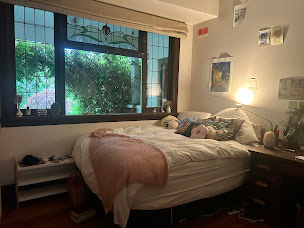Things have been rough for my mother recently. We are not reading Psalm 23 anymore. Instead, we read angry psalms, like 142 and 143, and even more often Psalm 22:
I am poured out like water,
and all my bones are out of joint.
My heart has turned to wax;
it has melted within me.
15 My mouth[d] is dried up like a potsherd,
and my tongue sticks to the roof of my mouth;
you lay me in the dust of death.
My mother listens intently, nodding. And then the psalm pivots into praise, and she brushes away tears. She says, “that is so right”. And she smiles.
It is so hard to sit beside this slow decline. To watch her dignity stripped away, inch by inch. And yet there are bright times. She came to our place for dinner to say goodbye to Lizzy as she headed to Australia, sitting at the head of the table, the matriarch of the family. And today was a good day.

After we have read angry psalms and got that out of our system, I ask her what she would like me to read to her. We’ve just started reading through Luke’s gospel, taking one or scenes at a time. Sometimes she chooses the Lion, the Witch, and the Wardrobe instead. But today it was Luke – Mary’s Magnificat and the birth of John the Baptist.
I gain as much as she does from this reading. In order to bring things alive for her, I have to concentrate on detail, and I notice things I might have skipped over if I’d just been reading to myself. Today, when I put down the book, she seems to have had the same thought: “it’s such a detailed story, it almost seems real”.
It was real, I say.
She consider this.
Just think how exciting it must have been, I say. They’d been waiting for the Messiah for so long, and when John came, everyone must have been thinking “maybe this is it!” despite what Zachariah says.
Then I say in a mock dramatic TV-voice, IS this the one who was promised all along? ARE the promises of Yahweh about to be fulfilled??? Expect the unexpected! Tune in for next week’s episode for a surprising turn of events! Dum, Dum, Duuuum!
Oh, we should end readings at Mass like that, my mother says. So much better than [boring voice] this is the Gospel of Christ – thanks be to God. Where did that “Dum, dum, duuum” come from?
I think about it. 1960s Batman children’s programme, I say, and we both laugh.
We’re not making much progress through The Lion, the Witch, and the Wardrobe, she says. And I say not to worry, we can finish that after Luke’s gospel, There’s time for both, I say, there will be time. (I hope this is true.)
There will be time, there will be time, she says. Where does that come from?
T.S.Eliot I think, I say, and I look it up. The Love Song of J.Alfred Prufrock! I should have known that!
Yes, she says. What kind of professor of English doesn’t know that?
I start to read:
Let us go then, you and I,
When the evening is stretched out against the sky,
Like a patient etherised upon a table….
Stop, stop, stop! she says. I know this, How do I know this? Read it to me again.
I read the lines again, while she sits enthralled with her eyes closed.
We keep reading, stopping after every few lines.When we get to In the room, the women come and go, she finishes off the line, with an air of triumph. I wonder what the women were saying about Michelangelo, she says.
When I read about the yellow fog rubbing against the window pains and licking the corners of the evening she stops me. That doesn’t make sense!
Imagine the fog as being like a cat, I say, and we read it again and she claps her hands with glee.
There will be time, there will be time, I read…time for you and time for me, and time for a hundred indecisions, and for a hundred visions and revisions, before the taking of toast and tea.
Stop, stop,
she says, I can’t go on. It’s enough. I’m full. It's so….what’s the word?
Ambitious? Everything?
Enigmatic? I suggest. Evocative?
Yes, yes! Both those words, she says. She sits and thinks a little. Then she says, I don’t remember the poem, but I do. It’s like remembering a dream, or someone telling me about a dream – I can’t find it in my mind, but I know it. I know it. Do you know what I mean?
Yes, I
do. I know what it’s like to have poetry so deeply inside you that it reaches
back further than your mind, resting in your belly. Maybe I learnt that from her. I don't know anyone else who learned poetry by heart before they started school, as I did.
As we walk along the corridor for dinner, we recite, over and over, “In the room, the women come and go, talking of Michelangelo”. If anyone hears us they’ll think we’re crazy, says my mother, as I settle her at the table, drop a kiss on her head, and head out the door.
Tonight, I was walking one of the dogs at sunset, and in a gap in a hedge, I watched the sun gleam for a moment, just before it dipped beneath the turning earth. Dark thin clouds seemed to gather around the light, but the confluence of the dark etched clouds against the gleaming colour was so beautiful. The evening is stretched out against the sky, I thought.
I am so grateful for these bright
colours as I walk, reciting poetry with my mother, while evening slowly falls.











.jpg)





